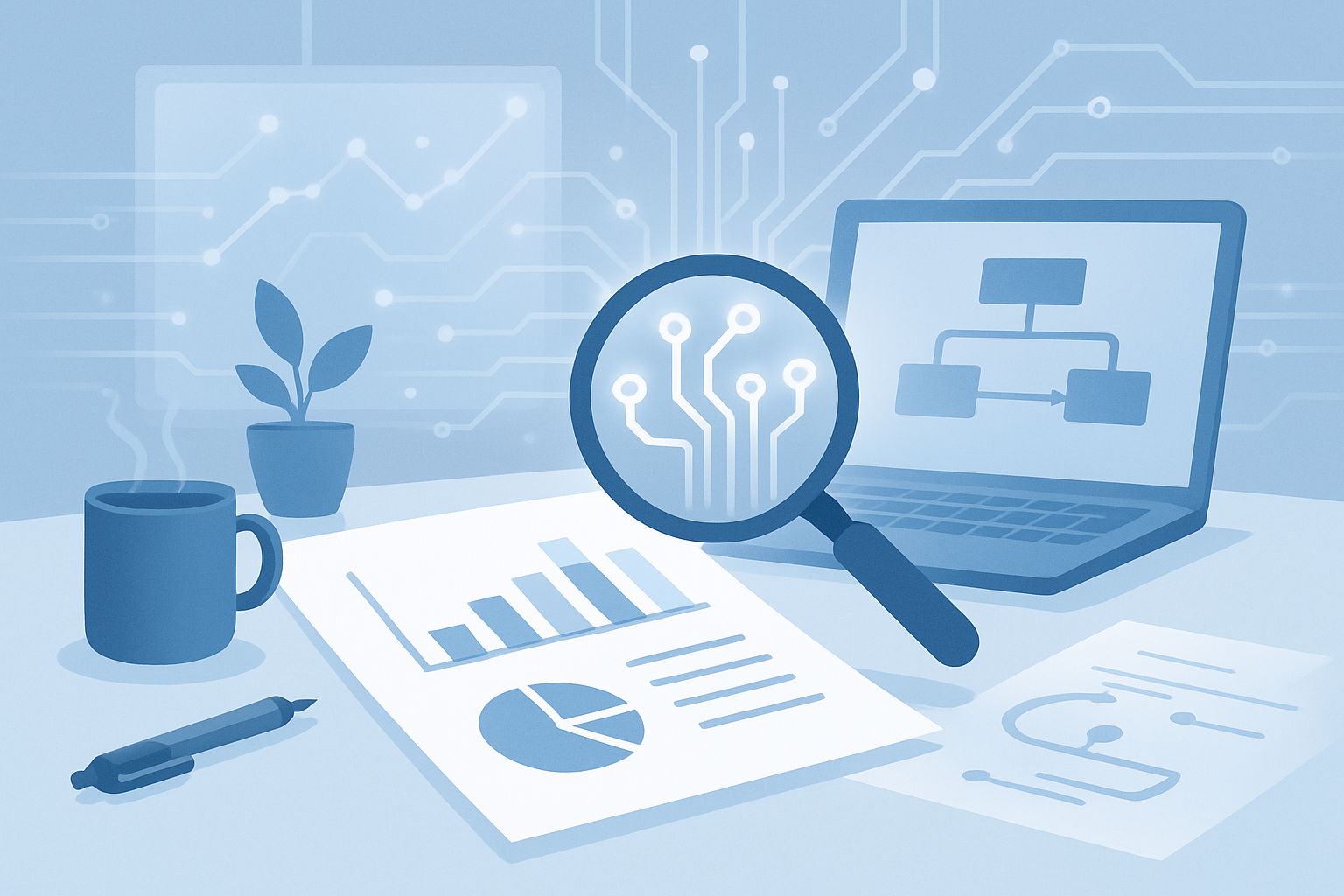Many founders and operators hear "AI audit" and immediately think of complex technical assessments requiring deep expertise. But the reality is much simpler—and more powerful. An AI audit is essentially a systematic review of your business processes to identify where artificial intelligence can create the most value.
What is an AI Audit?
An AI audit is a structured evaluation of your business operations to identify:
- Repetitive tasks that could be automated
- Data-rich processes that could benefit from AI insights
- Bottlenecks that AI could help eliminate
- Opportunities for intelligent decision-making
Think of it as a business health check with an AI lens.
The AI Audit Process
Phase 1: Process Mapping
We start by mapping your current business processes:
- Document Current Workflows: Every task, decision point, and handoff
- Identify Pain Points: Where are the bottlenecks and frustrations?
- Measure Time Investment: How much time does each process take?
- Assess Error Rates: Where do mistakes commonly occur?
Phase 2: AI Opportunity Assessment
For each process, we evaluate:
- Automation Potential: Can this be fully or partially automated?
- Data Requirements: What data is needed for AI to work effectively?
- ROI Calculation: What's the potential time and cost savings?
- Implementation Complexity: How difficult would it be to implement?
Phase 3: Prioritization and Roadmap
We create a prioritized list of AI opportunities:
- Quick Wins: High impact, low complexity
- Strategic Initiatives: High impact, medium complexity
- Future Opportunities: High impact, high complexity
What You'll Discover
1. Hidden Time Sinks
Most businesses have processes that consume hours every week without anyone realizing it:
- Manual data entry and reconciliation
- Repetitive email responses
- Report generation and formatting
- Basic customer service inquiries
2. Decision-Making Bottlenecks
AI can help with decisions that currently slow down your operations:
- Customer prioritization
- Resource allocation
- Risk assessment
- Performance evaluation
3. Data Opportunities
You might be sitting on valuable data that AI could analyze:
- Customer behavior patterns
- Operational inefficiencies
- Market trends
- Performance metrics
Real Audit Examples
E-commerce Business Audit
Before AI Audit:
- Manual inventory updates across 3 platforms
- Customer service team spending 60% of time on basic inquiries
- Weekly reports taking 8 hours to compile
After AI Implementation:
- Automated inventory synchronization
- AI chatbot handling 70% of customer inquiries
- Automated reporting with real-time dashboards
Result: 25 hours saved per week, improved customer satisfaction
SaaS Business Audit
Before AI Audit:
- Manual lead scoring and qualification
- Ad-hoc customer success outreach
- Reactive support ticket handling
After AI Implementation:
- AI-powered lead scoring and routing
- Proactive customer success alerts
- Intelligent ticket prioritization
Result: 40% increase in conversion rate, 50% reduction in churn
The Audit Deliverables
After your AI audit, you'll receive:
1. Process Analysis Report
- Detailed mapping of current workflows
- Time and cost analysis for each process
- Pain point identification and prioritization
2. AI Opportunity Matrix
- Ranked list of AI implementation opportunities
- ROI projections for each opportunity
- Implementation complexity assessment
3. Implementation Roadmap
- Phase 1: Quick wins (0-3 months)
- Phase 2: Strategic initiatives (3-6 months)
- Phase 3: Advanced implementations (6-12 months)
4. Tool Recommendations
- Specific AI tools and platforms to consider
- Integration requirements and considerations
- Vendor evaluation criteria
Common Misconceptions
"AI Audits are Only for Tech Companies"
False. Every business has processes that can benefit from AI, regardless of industry.
"AI Audits Require Technical Expertise"
False. The audit focuses on business processes, not technical implementation.
"AI Audits are Expensive"
False. The audit itself is typically free, and the ROI from implementation far exceeds any costs.
"AI Audits Lead to Job Losses"
False. AI typically augments human capabilities, allowing teams to focus on higher-value work.
What Makes a Good AI Audit
1. Business-Focused Approach
The audit should focus on business outcomes, not just technical possibilities.
2. Practical Recommendations
Every recommendation should include clear implementation steps and ROI projections.
3. Team Involvement
The audit should involve key team members to ensure buy-in and accurate process mapping.
4. Ongoing Support
The audit should be the beginning of a relationship, not a one-time assessment.
Getting Started
The best time to conduct an AI audit is now. Here's why:
- Early Advantage: Companies that implement AI early gain competitive advantages
- Cost Efficiency: Early implementation is typically less expensive than retrofitting later
- Team Readiness: Your team can adapt to AI gradually rather than all at once
- Data Accumulation: The sooner you start, the more data you'll have for AI systems
The Next Steps
- Book Your Free Audit: Schedule your AI audit
- Prepare for the Session: Think about your biggest operational challenges
- Involve Your Team: Include key team members in the audit process
- Review Recommendations: Take time to understand each opportunity
- Start with Quick Wins: Implement the highest-impact, lowest-effort solutions first
The Bottom Line
An AI audit isn't about replacing your team or overhauling your business. It's about identifying opportunities to work smarter, not harder. The insights you gain can transform how you operate, freeing up time and resources for the strategic work that drives growth.
Ready to discover what AI can do for your business? Book your free AI audit today.
Remember: The goal isn't to become a tech company—it's to use technology to become a better version of your company.
